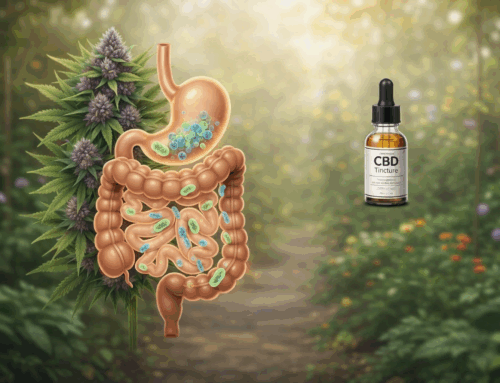Crohn’s sickness is an ongoing fiery gut illness (IBD) that can cause irritation, torment, and other crippling side effects in the gastrointestinal system. It essentially influences the digestive organs, yet it can include any piece of the gastrointestinal (GI) framework. However the specific reason for Crohn’s illness isn’t completely perceived, it is accepted to be a blend of hereditary, natural, and insusceptible framework factors. For those experiencing Crohn’s sickness, overseeing side effects like stomach torment, loose bowels, exhaustion, and hunger is a significant piece of day to day existence.
Throughout the long term, medical marijuana has arisen as a likely restorative choice for those living with Crohn’s infection. The cannabinoids tracked down in pot — especially tetrahydrocannabinol (THC) and cannabidiol (CBD) — collaborate with the body’s endocannabinoid framework, an organization that controls different physiological cycles, including resistant capability, irritation, and torment discernment. In this article, we’ll investigate how medical marijuana works in treating Crohn’s illness, its likely advantages, the components behind its belongings, and the ongoing proof supporting its utilization.
What is Crohn’s Infection?
Crohn’s infection is a sort of fiery inside illness (IBD) portrayed by constant irritation of the gastrointestinal system. It can influence any piece of the GI lot, from the mouth to the rear-end, yet most usually influences the ileum (the last piece of the small digestive tract) and the colon (internal organ). The sickness makes the insusceptible framework erroneously assault the gastrointestinal parcel, prompting ulcers, enlarging, and harm to the tissue. This persistent irritation can prompt a scope of side effects, including:
- Stomach torment and squeezing
- Persistent looseness of the bowels (in some cases with blood or bodily fluid)
- Weakness
- Weight reduction and unhealthiness
- Fever
- Queasiness and spewing
- Joint torment
- Skin rashes
The specific reason for Crohn’s illness stays hazy, yet it is believed to be affected by hereditary qualities, ecological variables, and a strange invulnerable reaction. Treatment choices for Crohn’s illness ordinarily incorporate drugs like corticosteroids, immunosuppressants, biologics, and, at times, medical procedure. While these medicines can be compelling, they frequently accompany incidental effects, and they don’t necessarily give adequate help from side effects. This is where medical marijuana has come into center as a possible adjunctive treatment.
The Endocannabinoid Framework and Its Part in Crohn’s Illness
The endocannabinoid framework (ECS) assumes a vital part in controlling a few fundamental physical processes, including resistant reaction, irritation, torment sensation, assimilation, and hunger. The ECS comprises of cannabinoid receptors (CB1 and CB2), endogenous cannabinoids (endocannabinoids), and compounds that assist with separating cannabinoids.
CB1 receptors are basically tracked down in the cerebrum and focal sensory system, yet they are additionally present in the digestion tracts. These receptors are associated with controlling agony, temperament, and absorption.
CB2 receptors are tracked down principally in the safe framework and fringe organs, including the digestion tracts. They are engaged with tweaking aggravation and insusceptible capability.
The connection between the cannabinoids in pot and the ECS is remembered to impact the provocative reaction and safe capability in the body. On account of Crohn’s infection, the ECS might assist with controlling the irritation that portrays the condition, making cannabinoids a likely restorative choice for overseeing side effects and advancing recuperating.
How Medical Marijuana Can Assist with Crohn’s Sickness
While more examination is required, existing investigations and narrative proof propose that medical marijuana can have a scope of helpful advantages for those experiencing Crohn’s illness. These advantages incorporate help with discomfort, diminished irritation, further developed hunger, and better generally speaking personal satisfaction.
- Decreasing Irritation
One of the trademark elements of Crohn’s illness is ongoing irritation in the GI lot, which can cause a large number of side effects, including stomach torment, the runs, and weariness. Cannabinoids, especially CBD, have been displayed to make calming impacts.
CBD, specifically, collaborates with CB2 receptors in the resistant framework and can regulate the arrival of favorable to fiery cytokines, which are particles that advance aggravation. By decreasing aggravation in the GI plot, medical marijuana might assist with easing the difficult and awkward side effects of Crohn’s illness.
A review distributed in Clinical Science in 2005 analyzed the impact of marijuana on provocative entrail illnesses (IBD) and found that cannabinoids could decrease irritation in the digestive coating, giving an expected component to help in Crohn’s sickness.
- Help with discomfort
Ongoing stomach torment is one of the most well-known and weakening side effects of Crohn’s illness. Customary agony prescriptions, for example, narcotics and nonsteroidal calming drugs (NSAIDs), are not generally compelling and can accompany critical secondary effects, including compulsion, gastrointestinal dying, and kidney harm.
Cannabinoids, particularly THC, have pain relieving (torment easing) properties that work by restricting to CB1 receptors in the sensory system and adjusting torment discernment. By following up on both the focal sensory system and the fringe resistant framework, cannabinoids can diminish agony and uneasiness in individuals with Crohn’s sickness.
Research has proposed that pot might be powerful in treating instinctive agony (torment starting from inner organs), which is especially normal in conditions like Crohn’s sickness. One review distributed in Torment Medication found that weed utilize altogether diminished torment and worked on personal satisfaction for patients with IBD, incorporating those with Crohn’s sickness.
- Decreasing The runs and Further developing Entrail Capability
The runs is a typical side effect of Crohn’s illness, especially during eruptions. The cannabinoids in medical marijuana can assist with directing gut motility, possibly lessening loose bowels and working on by and large GI capability.
Both THC and CBD have been found to impact the stomach mind hub, which is the correspondence pathway between the focal sensory system and the digestion tracts. This collaboration directs gastrointestinal motility, discharge, and retention, which might lessen the recurrence and seriousness of the runs in Crohn’s patients.
A review distributed in the European Diary of Gastroenterology and Hepatology in 2011 found that THC could lessen gastrointestinal motility in patients with IBD, giving additional proof to its possible job in further developing gut capability.
- Hunger Excitement and Weight Gain
Many individuals with Crohn’s infection experience weight reduction and unfortunate craving because of a mix of elements, including irritation, malabsorption, and stomach related inconvenience. Keeping up with sufficient nourishment is significant for dealing with Crohn’s sickness and forestalling lack of healthy sustenance, which can worsen side effects and slow recuperation.
Marijuana, especially THC, is notable for its craving invigorating impacts. THC ties to CB1 receptors in the cerebrum, setting off the arrival of craving animating chemicals, for example, ghrelin, which increments hunger. This “munchies” impact can be useful for Crohn’s patients who battle to keep a solid weight and get sufficient nourishment during eruptions.
Furthermore, research has shown that pot use can further develop food admission and weight gain in patients with persistent sicknesses, including IBD. As a matter of fact, a review distributed in The American Diary of Gastroenterology in 2013 found that patients with IBD who involved medical marijuana revealed upgrades in craving and weight gain, proposing that pot might be an important device in dealing with the healthful difficulties of Crohn’s sickness.
- Overseeing Uneasiness and Stress
Living with Crohn’s illness can cause critical pressure and uneasiness, especially during eruptions or while managing the unconventionality of side effects. Persistent pressure can fuel irritation and demolish gastrointestinal side effects, making an endless loop for those with IBD.
Cannabinoids like CBD have been displayed to have anxiolytic (nervousness diminishing) properties. CBD works by connecting with serotonin receptors in the cerebrum, advancing a feeling of quiet and unwinding. THC, as well, may assist with diminishing nervousness and further develop mind-set, in spite of the fact that its psychoactive impacts may not be appropriate for all patients.
For the majority Crohn’s patients, lessening uneasiness and stress can prompt a reduction in side effect seriousness and work on generally speaking prosperity.
- Advancing Mending and Diminishing Illness Action
While marijuana isn’t a solution for Crohn’s illness, it might assist with regulating the safe reaction in manners that lessen sickness action. Review propose that cannabinoids can impact the capability of resistant cells in the digestive organs, possibly prompting a decrease in the immune system goes after that add to irritation in the intestinal system.
In preclinical examinations, cannabinoids have been displayed to repress the enactment of provocative pathways and advance the goal of aggravation. While these outcomes are promising, more clinical preliminaries are expected to decide if pot can effectively recuperate digestive tissue and diminish the recurrence of Crohn’s illness eruptions.
Dangers and Contemplations
While medical marijuana offers likely advantages, it isn’t without gambles. Here are a few significant contemplations for Crohn’s patients pondering utilizing pot:
- Psychoactive Impacts: THC can cause inebriation, adjusted perception, and uneasiness, which may not be attractive for all patients. Low-portion THC or CBD-prevailing items might be more appropriate for certain people.
- Drug Associations: Pot can communicate with specific prescriptions, including immunosuppressants, steroids, and different medications used to treat Crohn’s infection. Counseling a medical care supplier prior to beginning weed therapy is significant.
- Respiratory Issues: Smoking weed can aggravate the lungs, so patients with Crohn’s sickness who additionally have respiratory issues might need to abstain from smoking. Vaporizers, edibles, or oils might be better other options.
- Absence of Normalization: The weed business isn’t exceptionally controlled, and the power of marijuana items can fluctuate broadly. It’s vital to utilize items from respectable sources and to screen measurements cautiously.
Medical marijuana has shown potential in dealing with the side effects of Crohn’s illness, including irritation, torment, looseness of the bowels, hunger misfortune, and uneasiness. While more examination is expected to completely comprehend the degree of its advantages and dangers, early investigations and patient tributes propose that marijuana might be a significant adjunctive treatment for those experiencing this constant condition.
As usual, patients considering medical marijuana ought to talk with their medical services supplier to decide the most suitable therapy plan or help in getting medical marijuana card for their singular requirements and qualifying conditions.
FAQ
Can medical marijuana help reduce Crohn's disease symptoms?
Yes, medical marijuana, especially cannabinoids like THC and CBD, can help reduce inflammation, relieve pain, control diarrhea, improve appetite, and reduce anxiety for some people with Crohn’s disease.
Is medical marijuana effective in treating Crohn’s disease flare-ups?
While not a cure, medical marijuana can help manage symptoms during flare-ups, such as reducing inflammation and easing abdominal pain, which may provide relief during active disease periods.
What are the side effects of using medical marijuana for Crohn's disease?
Potential side effects include dizziness, fatigue, altered mood, and, in some cases, anxiety or nausea. THC may also cause psychoactive effects like euphoria or confusion, which may not be suitable for all patients.
Can medical marijuana improve appetite and help with weight loss in Crohn’s disease?
Yes, THC has appetite-stimulating effects and may help increase food intake and promote weight gain, which is beneficial for Crohn’s patients experiencing weight loss due to the disease.
How can I get a medical marijuana card for Crohn's disease?
To obtain a medical marijuana card, you typically need a doctor’s recommendation or prescription. Requirements vary by state, so it’s important to check local regulations and consult with a healthcare provider for guidance.





